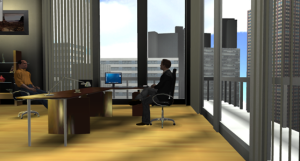 Have you ever experienced friction with colleagues from different departments, a particular manager or employee? I’m pretty sure you have at some point in your life, I certainly have. Several reasons could be the cause of the friction, some simply due to conflicting characters, however quite often it is due to a difference in perspectives, goals and agendas. Did you find these frictions painful?
Have you ever experienced friction with colleagues from different departments, a particular manager or employee? I’m pretty sure you have at some point in your life, I certainly have. Several reasons could be the cause of the friction, some simply due to conflicting characters, however quite often it is due to a difference in perspectives, goals and agendas. Did you find these frictions painful?
I did. I once had to compete with a colleague to get onto a project. It had been agreed that I would take the lead, but somehow the colleague fought back and tried to take over. I ended up having to be pretty brutal to shut him off (well, not literally, I just had to stop sharing information on the project and stop talking to him). It was certainly painful and I did put myself repeatedly in his shoes to understand his perspective and try to lower the friction. I concluded that his behaviour was still not justified so kept my ground and the lead on the project. After that, I didn’t feel good our relationship was difficult for quite a while. Fortunately it got better in the end.
Being able to reduce these frictions would be a big improvement in work life. Interested to find how? Let’s dig into it.
 If you could sit for a while in the position of that particular person you had friction with, it would definitely improve your work relationships. Through improved empathy, you would also be more effective and efficient. And sitting in another position at a different department or at a different level in your company will also bring these benefits.
If you could sit for a while in the position of that particular person you had friction with, it would definitely improve your work relationships. Through improved empathy, you would also be more effective and efficient. And sitting in another position at a different department or at a different level in your company will also bring these benefits.
There is a reality TV show that you might have heard about or watched called Undercover Boss. In the program, basically, a Chief Executive of a company changes his/her appearance and pretends to be a new employee in the firm. He then role plays as a new employee and experiences the day to day life or a typical employee in a department. That way he can get a better perspective on the life of that employee and department, and find out what works well and what needs to be improved. At the end of the program, the CEO will reveal his identity and then make a plan for necessary changes in the company.
This experiment can be recreated pretty easily in Virtual Reality. Similarly, VR can allow for anyone in the company to take a different role. That way, he/she would better understand the perspective of colleagues or employees, this at a relatively low cost. Various positions can be explored such as:
- Being an executive
- Being a manager
- Being an employee
- Working in a different department (finance, sales, marketing, production, purchasing, HR, R&D, customer support, IT, front desk, catering, etc.)
An online virtual office world could be devised in which employees would swap positions. Each
employee in a specific position (his/her normal job) is normally able to devise various scenarios that happen on their typical day. They can also specify what tasks need to be accomplished on a daily basis. Leveraging this knowledge, each position in the company can be recreated in a VR world, so that any employee can then role play the position. Then, in this online world, a virtual company could run with employees having swapped their positions.
Not only would these simulations help improve relationships and effectiveness, but they could also uncover some hidden talents. It could well be found that some employees are better in another position than their current one (e.g. a person in HR might be doing a good sales job).
Of course, this would also bring some challenges as, taking the example above, a position in sales might not be available and it might not be possible to create it. The smaller the company generally, the bigger the challenge will be to move people to different positions.
An offline VR experience could be created in parallel or in isolation from the online one. This experience would bring similar benefits to the online experience, but in a more controlled way. However the benefits of the many interactions with colleagues occuring in the online world would be lost here.
This offline experience could alos potentially be used to run assessment centers when recruiting new employees.
In summary, there is a lot of potential for VR to be beneficial in the office world, and this is only exploring swapping positions. VR can bring many more benefits, like for example running virtual meetings with people around the world, without anyone having to travel, but this is not the topic of this post.
In the next post, we will explore making changes in someone’s life environment.












Please share your comments